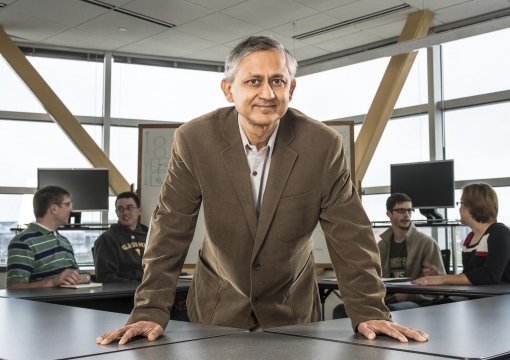
Prof. Amit Sheth will be a keynote speaker at SEMANTiCS. Prof. Sheth is an Educator, Researcher, and Entrepreneur. Amongst the most cited computer scientists in the world, he is the founding director of the AI Institute at the University of South Carolina.
SEMANTiCS has been the leading European conference for semantic technologies and AI for 15 years. Its first edition in the US will take place from 21 to 23 April 2019 and will cover topics such as Explainable AI, Knowledge Graphs, Semantic Technologies, and Data Governance. Here, Prof. Amit Sheth tells us about some of the topics he will bring to this edition of SEMANTiCS.
What can people expect from your keynote at Semantics?
I will give a background of the first patent on semantic web, which described the first commercial product/service on semantic search, browsing, personalization, and advertisement. My objective here is to describe the enduring principles of (a) creating and managing structured knowledge from diverse sources, (b) semantically annotating and indexing diverse data using this knowledge, and (c) computational techniques that then support a wide variety of semantic applications (from search to analysis and decision making) that have benefits over their non-semantic counterparts.
Second I will describe the early realization that both statistical AI techniques that support the use of implicit knowledge, and symbolic AI that use explicit knowledge, need to coexist even when the traditional semantic web and machine learning approaches developed independently and without much effort in exploiting their synergistic capabilities.
Finally, I will describe the current efforts on knowledge-infused learning, classified as the shallow, semi-deep, and deep infusion of knowledge (semantic representation) into deep learning. We all know that deep learning techniques have been remarkably successful but can be made even more powerful with respect to the challenges I identified earlier.
Why do you seek to infuse knowledge in Deep Learning algorithms and what role do Semantic Technologies play?
The blending of deep/machine learning with structured knowledge (e.g., knowledge graphs or ontologies used in semantic technologies) which we call “Knowledge-Infused Learning,” is an approach to address challenges such as: (1) decreasing the dependence on large datasets, (2) reducing bias in the dataset, (3) providing ability to trace information allowing explainability of a model, (4) improving the search space for information specific to a domain since anomalies, irregularities and edge cases for which there may not be a large dataset to learn from, (5) reducing the complexity of model architecture, and (6) reducing false alarm in performance of a model. Semantic technologies bring expertise in creating, representing, and applying structured knowledge.
What is your vision for the future of Semantic Technologies?
Many of us working towards advancing machine intelligence are inspired by how a human brain works (I have called my version of this: Computing for Human Experience). My vision for semantic technologies is for it to find a place in future more powerful AI resulting from a synergy between the top-down processing (characterized by symbolic AI) and bottom-up processing (characterized by statistical AI) in human brains.
More on Prof. Amit Sheth